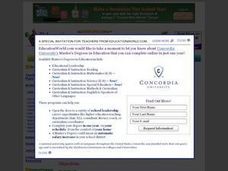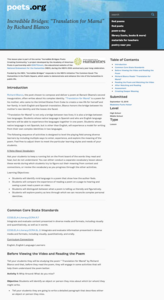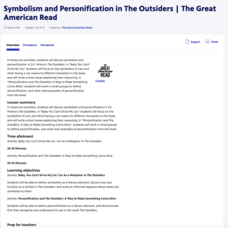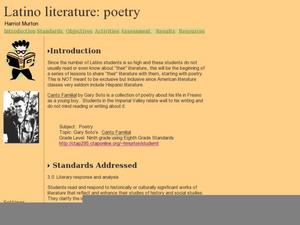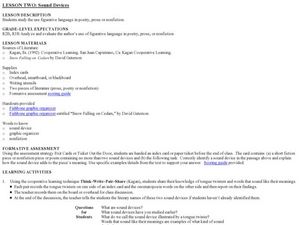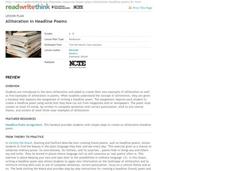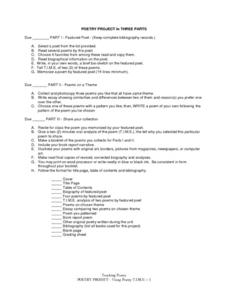Curated OER
Figurative Language-Part 1
Students explore figurative language. In this figurative language instructional activity, students look up, define, and give examples of a list of literary terms.
Curated OER
Poetry Shopping Spree
Scholars demonstrate the ability to evaluate authors' use of literary elements such as metaphor, simile, personification, imagery, and onomatopoeia. They are provided with a checklist and must shop for poems that contain the poetry terms...
Curated OER
Reliving History through Slave Narratives
Helpful for an American literature or history unit, this lesson prompts middle schoolers to examine slavery in the United States. They read slave narratives that were part of the Federal Writers' Project and then conduct their own...
EngageNY
Analyzing Poems from Inside Out and Back Again to Develop Criteria for an Effective Poem
Scholars analyze a model poem to help guide their poetry writing. They use Think-Pair-Share to discuss word choice and meaning in "Papaya Tree" and "Wet and Crying." To finish, they use their discussions to collect evidence on what makes...
Core Knowledge Foundation
Sixth Grade Poetry
Study some of the most prominent poets and works of poetry in history with a language arts poetry unit. From Virgil to Shakespeare to Dickinson to Angelou, the resources present biographies and examples of poetic elements to the sixth...
Curated OER
Irony in Poetry and Prose (Fiction and Non-fiction Texts)
Middle and high schoolers examine the impact of irony in poetry and prose. In this figurative language lesson, they read instructor-selected literature and identify uses of irony. Then they discuss how irony enhances literature.
Academy of American Poets
Incredible Bridges: “Translation for Mamá” by Richard Blanco
Who or what do you miss? That's the question that launches an activity that asks writers to craft a paragraph filled with sensory details that shows how they feel. Next, they listen to Richard Blanco reading his poem, "Translation for...
PBS
Symbolism and Personification in The Outsiders
A shirt can't really swallow you—right? Readers find examples of symbolism and personification in S.E. Hinton's The Outsiders with two straightforward lessons.
Curated OER
Latino Literature: Poetry
Under construction, this lesson focuses on Canto Familia, a collection of poetry about Gary Soto's experiences growing up in California's Imperial Valley. Representative of the experiences of many Latinos, the poems also address themes...
Henry County Schools
Ben Franklin Aphorisms
Is a pretend friend worse than an open foe? What benefits come to those who help themselves? Take a look at some of Benjamin Franklin's famous aphorisms, which advise readers to conduct themselves properly throughout the day. Pupils...
EngageNY
Rereading and Close Reading: Communism, “The Vietnam Wars,” and “Last Respects” (Pages 85 and 86)
What might a papaya symbolize? Using the resource, scholars look for examples of symbolism in the novel Inside Out & Back Again. They also participate in a silent discussion called a Chalk Talk, writing their responses to a...
EngageNY
Inferring About Character: Atticus (Chapter 5)
As part of their study of Harper Lee's To Kill a Mockingbird, class members participate in a silent discussion of the novel using a Chalk Talk chart. They then respond to the teacher's questions by writing their thoughts on the chart....
Curated OER
"Knot" the Whole Truth: Writing a Modern-Day Story with a Tall Tale's Voice
Beyond Paul Bunyan and his blue ox, tall tales can be a great way to teach young writers about word choice and voice in their writing. Using Jerry Spinelli's Maniac Magee and the Six-Trait Writing process, they begin to write their own...
Curated OER
Sound Devices
Learners examine the impact of sound devices in poetry, prose, and non-fiction. In this figurative language instructional activity, students read instructor-selected literature and identify uses of alliteration, repetition, consonance,...
ReadWriteThink
Alliteration in Headline Poems
Poetry is everywhere you look! Create found poems using headlines from newspapers and magazines. Young poetry focus on creating alliterative phrases with words they find in headlines, tying their poems to a central theme.
MENSA Education & Research Foundation
I Need a Superhero
Once the class learns about the hero's journey, they'll find it in every story and movie they see! Take characters from their humble beginnings to their atonement and apotheosis with a set of lessons about the hero's journey focusing...
Teaching English
Poetry Project in Three Parts
It’s poetry T.I.M.E! Individuals use the T.I.M.E. format (T = Title, thought, and theme; I = Imagery and figurative language; M = music and sound; E = emotion) to study a poet, collect poems that have a similar theme, and create a...
Curated OER
A Simile and Metaphor Lesson
Students use their knowledge of similes and metaphors to analyze poetry. In this poetry and language instructional activity, students read examples of similes and metaphors and write their own examples that describe their city,...
National Endowment for the Humanities
Language Analysis Based on Stave 1
Class members meet the original scrooge, the Dickens character whose name has become synonymous with a cold-hearted, tight-fisted, miser. Using the provided worksheet, readers closely examine context clues to determine the meanings of...
EBSCO Industries
Music and Poetry
Song lyrics, like poems, are meant to be heard. After examining the literary devices in several poems, scholars examine the lyrics of popular songs and identify the sound devices and the figurative language writers use to create the...
EngageNY
Analyzing Word Choice: Atticus’s Closing Speech (Chapters 20-21)
Choose your words carefully. Scholars begin by reading a line of Atticus's closing speech in To Kill A Mockingbird. Readers work independently on their note catchers, then complete a Think-Pair-Share activity with partners. They finish...
Curated OER
Image as Metaphor
A Dorothea Lange photograph launches this study of metaphors. Using the questions provided, the class examines the image and the title to consider how Lange uses her photo as a metaphor. Class members then select an object they can use...
Curated OER
Lift Every Voice and Sing
Students analyze sculpture, poetry, and music to gain an understanding of historical events. In this critical thinking skills lesson, students take a closer look at African-American history as they examine "Lift Every Voice and Sing'"...
Achieve3000
Context Clues and Idioms
Kids practice using five types of context clues (definition, synonym, antonym, example, and general) to decode idiomatic language.



